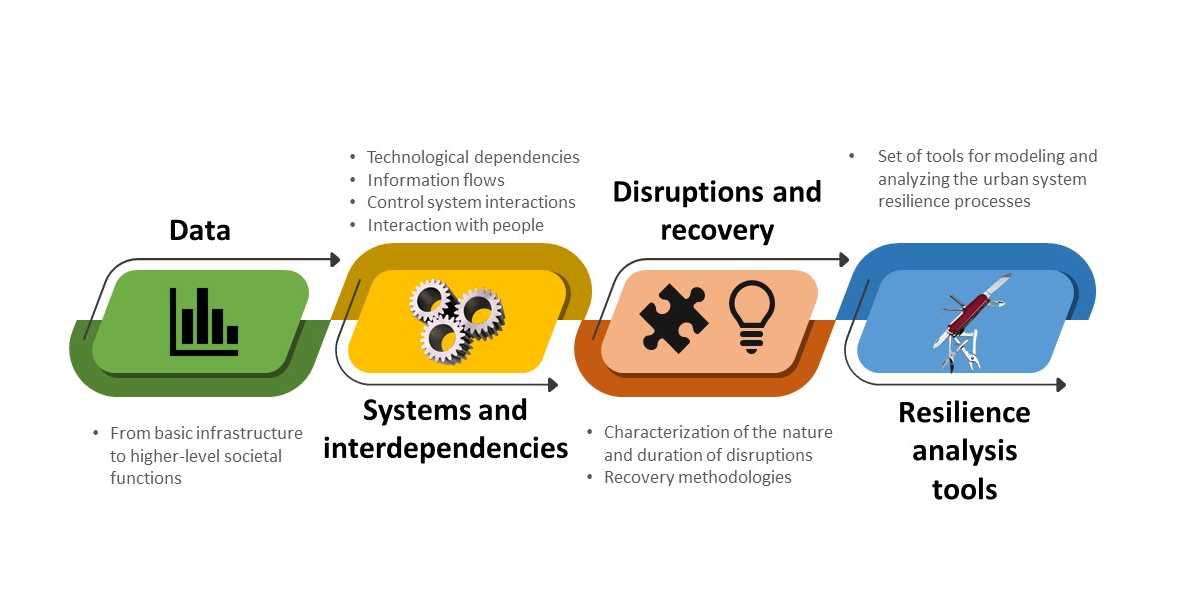System-of-Systems Resilience
The Systems-of-Systems Resilience Module focuses on modelling complex urban systems to analyse their resilience to disruptions. An urban system is a system-of-systems, layered from basic infrastructure support functions to higher-level societal functions, characterised by complex interdependencies. These include technological functional dependencies, co-locations, information flows and control systems interactions, as well as interactions with the people forming an urban society. Disruptions in urban systems may range from short-duration and intense ones, such as man-made security threats or natural disasters, to long-duration ones, such as climate change or adoption of new technologies.
Resilience of an urban system to disruptions entails the ability of its constitutive systems to manage their vulnerability and recovery while continuously interacting with other systems and the society they jointly serve. The principal outcome of modelling and analysis of the urban systems resilience processes is the set of methods to identify the critical risks and mitigate them, as well as to design short-term interventions and plan long-term change to make today’s and future urban systems more resilient.
The main research objectives of the module are as follows:
- Develop scalable dynamic I/O-table economy sectors models, scalable compositional flow-based infrastructure system models, and scalable systems control and data exchange models to analyse the disruption resilience of urban systems at different levels of granularity, detail and interconnectivity.
- Quantify and visualise the economic impacts of natural hazards by integrating hazard models, infrastructure flow-based models and macro-economic models of an urban system into a unified FRS disruption resilience modelling and the SEC visualisation and simulation platforms.
- Demonstrate methods to make urban systems resilient to technology and landscape change within a coupled transportation-commodities- occupancy-economy urban system-of-systems of Singapore. Examples could be based on electric vehicles adoption, re-developments and other land end-use changes within the urban context that imply significant changes in utilisation patterns.
- Define and parameterise the technological and societal aspects of urban density by using modelling and merging of datasets from different sources. Then, integrate these parameters into the unified FRS disruption resilience modelling platform, and examine how disruption resilience of urban systems is affected by their density.
- Collaborate with: Module 1, to develop and test efficient signal processing methods for real-time disruption detection and situation awareness in urban systems; Module 4, to integrate occupancy and use models of buildings and neighbourhoods, as well as urban climate models with the flow-based and macro-economic models of urban systems; Module 5, to coordinate social and financial models.

Expected outcomes
The principal outcome of the System-of-Systems Resilience module is a set of tools for modelling and analysis of the urban systems resilience processes. This is an integrated set of tools that allows for scaling of geographic scope, variation of the magnitude and duration of disruptions, infrastructure system granularity, technological complexity and cyber-integration, interaction among systems through data flow and control system, and quantification of resilience using multiple metrics, ranging from the functionality of individual systems to the operability of sectors of the national economy. Building on the first outcome, methods to identify the critical risks and mitigate them, as well as to design short-term interventions and plan long-term change to make future urban systems more resilient, will be conceptualised and demonstrated.
A case study on the adoption of electric vehicles in Singapore, considering coupled transportation, power, occupancy and economy systems, demonstrates the measures and tools to make the existing systems resilient to innovative, but disruptive technologies. Integration of the developed FRS urban system disruption resilience modelling and analysis tools into the SEC unified simulation and visualisation platform is an outcome expected not only to stand alone, but to also facilitate engagement with Singapore agencies and industry partners on knowledge transfer and work on specific “satellite” projects of mutual interest.
